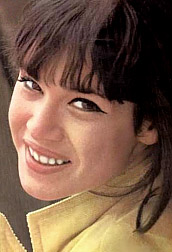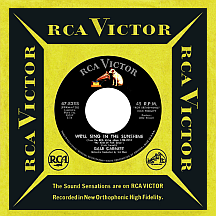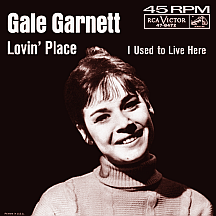GALE GARNETT
We'll Sing in the Sunshine
Acting, singing, songwriting and storytelling were among Gale Garnett's many interests as a child; she grew up to be successful at each of these artistic endeavors...and more. In the early 1950s, her family moved from Auckland, New Zealand, settling in Toronto, Ontario for a time before ending up in New York City, and it was all fine by her ("Fly Bird" was a childhood nickname; it simply meant she liked to wander). She attended the High School of Performing Arts and did some off-Broadway work as a teenager. Later, in Los Angeles, she began picking up small parts on television, starting with an October 1960 episode of the hit ABC series Hawaiian Eye. More TV roles followed, in drama series (Hong Kong, The Dick Powell Theatre, 77 Sunset Strip, Suspense), westerns (Stagecoach West, Tales of Wells Fargo, Bonanza, Have Gun - Will Travel) and comedy series (The Real McCoys).
The television appearances increased Gale's visibility, creating opportunities for her to perform in public as a folk singer. One edge she had on the competition was her contralto voice, a mature sound at odds with her petite image (Billboard magazine later referred to her as a "deep-toned" vocalist). She made her New York nightclub debut at the age of 21, in the fall of 1963, at the Blue Angel in Manhattan (named after the 1930 German film starring the great Marlene Dietrich, one of the few singers, perhaps, with a deeper voice than Gale's). Miriam Makeba, the sensational singer from South Africa, was among her guests at the club on opening night; at the time, she was quite impressed with the young thrush and had been performing some of Garnett's compositions in her own nightclub act.
Gale became an RCA Victor recording artist shortly afterwards, releasing her first album, My Kind of Folk Songs, which included her own deftly-written liner notes on the back cover. She made a case for the types of songs she'd chosen (a few self-penned), identified herself as a "white girl folk singer" and gave a shout out to (and included a song written by) "a great friend and a brilliant artist," the aforementioned Makeba. This first effort featured an orchestra conducted by RCA Victor staff writer and arranger Sid Bass, who wasn't exactly proficient in the folk field; the pairing made for an overall unique finished work.
One song from the album achieved great success after being released as a single. "We'll Sing in the Sunshine" was written by Garnett and elicited varying reactions from people. The lyrics of the bittersweet song dealt with what she called a "settle down fear," yet she considered the song "a happy approach to personal independence." The lyrics made a definite point of putting an abrupt time limit on a romantic relationship: '...the cost of love's too dear...but though I'll never love you, I'll stay with you one year.' Apparently a lot of people related as the record became a number one Cash Box hit in October 1964, coming close to the top on Billboard in addition to spending several weeks at number one on the Pop-Standard Singles (later Adult Contemporary) charts. She received two Grammy nominations for the song, winning Best Folk Recording at the April 1965 ceremony, topping a stellar selection of seasoned nominees: Harry Belafonte, Bob Dylan, Woody Guthrie, The New Christy Minstrels, Peter, Paul and Mary and gracious-loser/friend-for-life Miriam Makeba (Gale fell short in her bid for Best Vocal Performance, Female, standing aside while Barbra Streisand basked in one of her many glorious awards moments).

For the follow-up single, "Lovin' Place," she lyrically turned the tables on herself; this time it was the song's love interest that made the first move and bailed out of the relationship. It reached the middle range of the charts in early '65. The third single, "I'll Cry Alone," had to settle for a brief April-May run in "Bubbling Under" territory. Gale composed "The Sun is Gray," performed by Natalie Wood in the 1966 film Penelope (shown in the fictional Greenwich Village club "The Plush Pig," Natalie, wearing her brunette hair longer than usual, looked suspiciously similar to Gale); a version by Garnett was released at the same time. She was a regular on the Village scene, toured college campuses (opening for comedian Bill Cosby among others) and appeared at many nightclubs and folk music venues over the next few years.
Preoccupied by the demands of life as a singer with a major hit, a few years went by before she resumed acting with the Halloween-themed Mad Monster Party?, an animated film from Rankin/Bass Productions (creators of a successful series of TV specials that included Rudolph the Red-Nosed Reindeer in '64). The 1967 theatrical release featured voice work by Boris Karloff, Phyllis Diller and Garnett. She performed two songs in the film as her character, Francesca: "Our Time to Shine" and "Never Was a Love Like Mine." In September she again appeared onscreen in an episode of The Rat Patrol. That same year, after six albums and as many singles, she parted ways with RCA Victor. Within months Gale was the lead singer for Gentle Reign; "Breaking Through" was the band's first single on the Columbia label, from the album An Audience With the King of Wands. The 1968 debut was followed by another album in '69. Her contralto voice (tempered a bit by this time) seemed a good fit with the counterculture psychedelia of the late '60s; success was elusive but the band has since developed a cult following.
Remaining active in the arts, Gale continued acting onstage as well as in television and motion pictures; highlights include the 1980 film Tribute with Jack Lemmon, Mr. and Mrs. Bridge with Paul Newman and Joanne Woodward a decade later, and My Big Fat Greek Wedding in 2002, as Gale Zoe Garnett, the professional name she's used more recently, having abandoned her singing career many years ago. Since then she's performed in one-woman stage plays, written articles for magazines and newpapers and had four novels published covering a variety of subjects.



